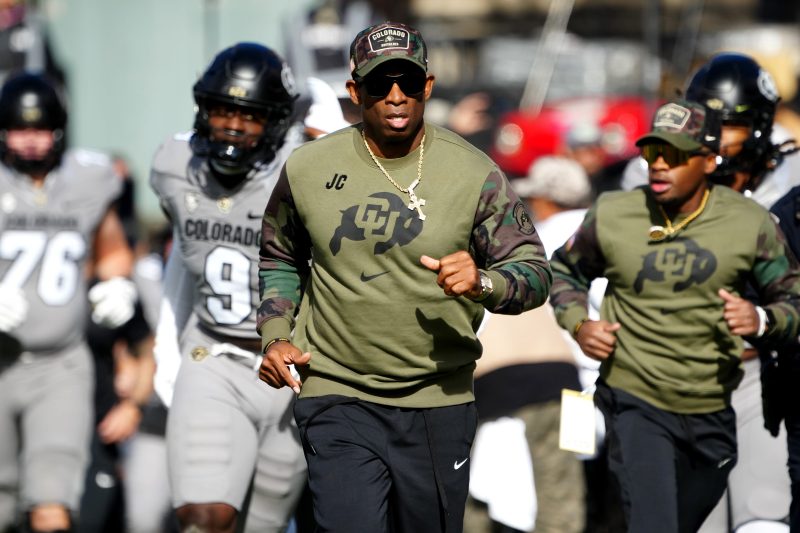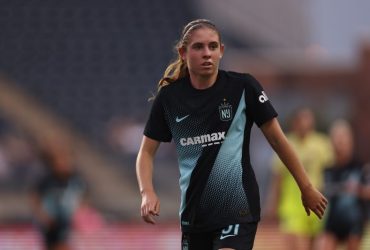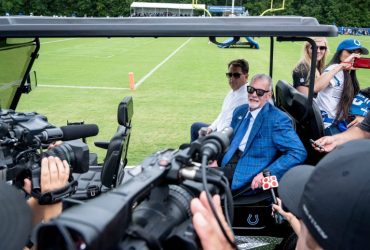Eternal optimist Deion Sanders seems to say stuff like this all the time:
‘We’re really going to be good.’
‘We’re gonna win. We’re gonna win. We’re gonna win.’
‘You gonna be pleased with what’s coming. I promise you that.’
He talked that way before the season, after he was hired to coach a Colorado football program that finished 1-11 in 2022. Then he talked that way after the season, when his team lost six consecutive games to finish 4-8.
So why should we believe him now?
Here are his three biggest failures and successes in 2023 − and how they show he may be right, or wrong, about being on the verge of a breakthrough in 2024:
Big failure No. 1: The offensive line
Deion Sanders and his staff overlooked the maintenance of this position, one way or another – through recruiting or retention during their massive roster overhaul before the season.
Five offensive linemen from last year left the team after the April spring game, including Jake Wiley, who went to UCLA, and Jackson Anderson, who transferred to Texas-San Antonio.
Wouldn’t some of those players have come in handy this season for Colorado, which ranked second nationally in most quarterback sacks allowed with 56? Last year, the Buffaloes only allowed 23 sacks during a 1-11 season. This season, the lack of protection from the line ended up costing the health of quarterback Shedeur Sanders, who ended the season with a fracture in his back.
Last week, on his Colorado Coaches Football Show, Sanders acknowledged “we built it differently” by bringing in skill position players without as much focus on linemen on the inside. He also said it’s being fixed.
‘We built from the outside-in,’ he said. ‘So the skill positions were established. Now the internal (line) is gonna be established. Because we already had the skill and we got skill coming from everywhere trying to get in now. You’ve got the phones jumping off the hook for the bigs (linemen) because they see a lack thereof. Therefore, you’ve got a multitude of bigs … who want to block for Shedeur.’
Big failure No. 2: The Stanford game
Sometimes a loss is so bad it can alter the trajectory of a season. At halftime of this game on Oct. 13, the Buffs were 4-2 and leading at home 29-0. Then after losing this game in double-overtime, 46-43, the Buffs never won again. Deion Sanders admitted he sensed “complacency” in his team at halftime. So why didn’t he do more about it?
Anything to stop the bleeding could have avoided it: more aggressive play-calling on offense, a trick play to shift momentum, a key stop on defense. It’s up to Sanders to help facilitate that so the roof doesn’t keep caving in a game like this.
If the Buffs had survived this one, they could have built momentum toward the minimum six wins required to become eligible for a postseason bowl berth. It could have changed the whole narrative of this season’s obituary.
Big failure No. 3: Unforced errors
Colorado lost five games by seven points or fewer. How many would the Buffs have won without so many unforced errors? Many of these mistakes relate to discipline and management, which all goes back to coaching.
The Buffs ranked second nationally with 107 penalties committed, behind only New Mexico (4-8), which rang up 119 penalties.
One coaching blunder against Oregon State Nov. 4 ended up being the difference in the game. Down 7-3 with 49 seconds left before halftime, the Buffs got the ball on their own 4-yard line.
If the Buffs had run the ball and run out the clock, that would have been the score at halftime. Instead, they got cute despite failing to move the ball all game before that. They attempted passes that fell incomplete on first and second down, stopping the clock and giving Oregon State just enough time to get the ball back to extend its lead to 14-3 with a touchdown right before halftime.
Deion Sanders blamed himself for the gaffe. Colorado lost, 26-19.
Another head-scratcher came in their final game last week at Utah, when the Buffs lost 23-17. Utah got the ball with 7:25 left in the game and then ran out the clock with a 12-play possession that ended on the Colorado 31-yard line as time expired. In other words, the Utes milked the clock for half a quarter by practically sitting on the ball to keep the Buffs from getting another chance to win at the end.
How is that even possible? One reason is the questionable use of timeouts. Colorado had burned two of its three timeouts in the third quarter, including one with less than two minutes after halftime. Sanders said he used one to avoid a five-yard penalty.
Big success No. 1: That glorious start
It was described as the biggest story in sports after the Buffs started 3-0 in front of sellout crowds and national television audiences on Fox and ESPN.
This was a credit to Sanders’ coaching ability – getting his players to believe they had it in them to beat TCU in the season opener and then carry it over two more games after that, against Nebraska and Colorado State.
But they couldn’t sustain that belief, apparently. It almost seemed like the fire burned too hot, too soon and then burned out. Why? Sanders said it was because they lost the necessary “attitude.”
Last week, Sanders still promised to get back the magic. Next year, the Buffs’ first three games are at home against North Dakota State Aug. 31, then at Nebraska Sept. 7 and at Colorado State Sept. 14. They then play in the Big 12 Conference after leaving the Pac-12, where they went 1-8 in 2023.
‘The climax we gave you early on, we gonna get you back there because I know you liked that ride, didn’t you?’ he said. ‘We gonna get you back there.’
Big success No. 2: Upgrading the talent
Shedeur Sanders, son of the coach, was the best quarterback at Colorado since Kordell Stewart in 1994. Two-way star Travis Hunter was the best all-around player in Boulder since the 1930s, when Byron “Whizzer” White played offense, defense and kicker.
Both are set to return in 2024, along with Colorado’s best talent in the defensive backfield since the Buffs won two Jim Thorpe Awards for the nation’s best defensive backs in 1992 and 1994. The depth chart there includes Hunter, safety Shilo Sanders (another son of the coach) and Cormani McClain, the No. 1 cornerback recruit in 2023.
What happens next year after a year of improvement, better blocking and a better supporting cast? The Buffs only had 11 scholarship players who were in their final year of eligibility in 2023 out of a scholarship limit of 85. The transfer portal heats up again Dec. 4, and Sanders plans to target a “plethora” of players from it.
Big success No. 3: Bringing the hype
Critics have taken jabs at Deion Sanders for his habit of being followed around by video cameras and fanning the flames of hype. Let’s be honest about that, though. Those critics are jealous.
Sanders is a marketing tour de force made for the age of YouTube and social media. The advertising value of the attention the Buffs received after hiring Sanders last year through their first four games of 2023 was $249 million more than the same period a year earlier, according to Cision, the university’s media-monitoring service.
What coach wouldn’t want that?
A spotlight that bright helps attract recruits, sell tickets and move merchandise. The Buffs sold out every home game this year for the first time ever and played in front of sellout crowds in 11 of their 12 games. On television, the Buffs entered their final game of the season as the most-watched team in America with 54.3 million viewers, not counting games on the Pac-12 Network, where the viewership wasn’t reported.
According to Sanders, now it’s just a matter of using that spotlight to go shopping for players and bring home the ingredients the team needs.
‘We right on schedule with the plan,’ he said last week. ‘The plan is improve every dern thing we touch. Did we sell out every game? Did this team get better? Is hope instilled? What’s the problem? Somebody tell me what’s the problem.’
Follow reporter Brent Schrotenboer @Schrotenboer. Email: bschrotenb@usatoday.com





